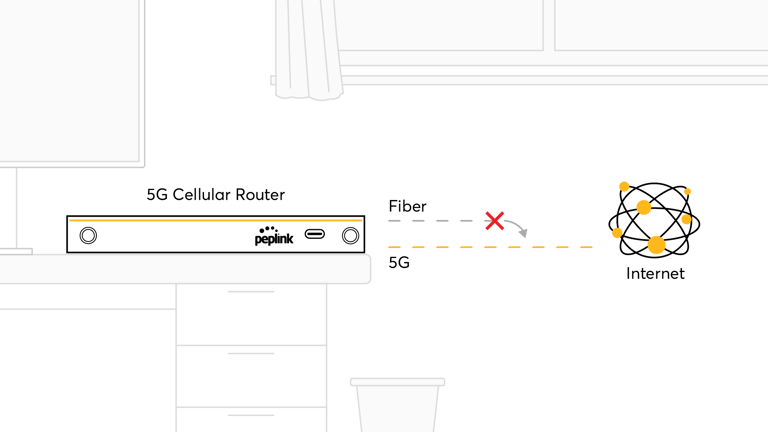Is 5G a backup for Fiber?
Disruptions to Internet connections can be inconvenient and even financially devastating for businesses running mission-critical applications. Fiber Internet, or fiber-optic broadband, uses fiber-optic cables to transmit data – and these connections are known for being reliable and fast. However, fiber Internet can fail due to interference, signal congestion, environmental conditions or other factors. Having a Plan B in case of disruptions is essential, and a 5G cellular router can help to ensure business continues as usual during unplanned downtime.
Why 5G serves as an optimal backup for fiber

Deployment & Flexibility
Deploying a 5G backup can be relatively quick, especially when compared to laying additional physical lines. Without fiber cables, you can quickly connect just by plugging in. As a result, you can switch to 5G quickly when there’s an emergency and fiber Internet isn’t available. In addition, if your business or facility moves, 5G mobile routers can easily move with it, while fiber generally needs to be installed again.
High Data Speeds & Increased Traffic Capacity
5G offers high data speeds, potentially up to 20 Gbps in peak conditions. In many real-world scenarios, it can offer speeds that rival some fiber connections, making it a viable backup option in terms of raw speed. This differs from 4G LTE, which typically offers peak data rates of 1 Gbps (1 gigabyte per second. Learn more about 4G LTE vs 5G cellular routers.
Low Latency
One of the major benefits of 5G is its low latency, which can go as low as 1 millisecond in specific scenarios. This makes it ideal for applications that rely on real-time data transmission.
Lower Installation Costs
Some 5G routers may be more expensive, but in general, 5G is usually less expensive and faster to install than fiber Internet. Overall costs vary based on the features included and other factors.
Wide Range of Use Cases
Businesses like ecommerce platforms and data centers and critical infrastructure need constant Internet connectivity. For businesses that use fiber, 5G is critical in case the primary fiber connection fails. Temporary setups, like events or construction sites, often use 5G as a primary connection and backup due to its flexibility and quick deployment. See case studies.
Network Redundancy
Multiple layers of backup systems can help businesses stay always on. Some businesses have backup fiber line from a different provider plus 5G backup to ensure business operations continue to run seamlessly even if multiple failures occur.
Increased Network Capacity
Just like a regular router, a 5G cellular router provides Internet access to laptops, tablets, TVs, computers, and other devices – but it can connect more devices simultaneously than LTE routers. This is helpful for businesses that have multiple users and devices connecting to the Internet.
Using 5G as a backup for fiber Internet can be a smart decision for individuals and businesses needing reliable and stable Internet connectivity. In addition to being easy to set up, 5G cellular routers connect to ultra-fast 5G cellular networks offering significantly higher speeds, lower latency, and increased network capacity. As these networks expand, 5G’s role as a stable backup option will only continue to increase. In many cases, 5G is even replacing fiber Internet connections as the primary way to connect.
Power your future with Peplink 5G cellular routers
Faster download and upload speeds, real-time responses, extended coverage, and general connection stability are critical for today’s Internet users. enterprise routers, small office routers and fiber+5G backup routers from Peplink represent an evolution in mobile connectivity solutions, because they harness the power of new 5G networks to provide faster, more reliable connections.
Back up fiber with Peplink 5G cellular routers
Contact Peplink or one of our certified partners to discuss your fiber backup plan